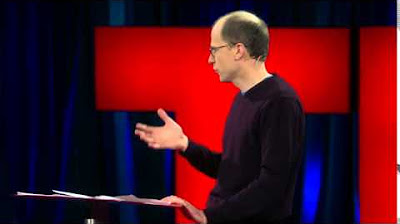Intelligenza artificiale e deficienza naturale | Filippo Ongaro
Summary
TLDRThe speaker reflects on the importance of addressing human natural deficiencies alongside the rapid development of artificial intelligence. They express concern about the lack of focus on improving our inherent shortcomings and the potential for technology to amplify rather than mitigate these issues. The speaker advocates for a balanced approach, emphasizing the need for personal growth, ethical values, and constructive societal interaction to ensure that technological advancements align with the betterment of humanity.
Takeaways
- 🤖 The importance of balancing artificial intelligence development with addressing human natural deficiencies.
- 🌱 The speaker is optimistic about AI's potential for human development but also expresses concern about humanity's shortcomings.
- 💡 The concern that the focus on AI might overshadow the need to address and improve upon our natural human deficiencies.
- 🚶 Human imperfections are acknowledged as a reality, and there's a call for more attention to personal growth and self-improvement.
- 🌐 The observation that society seems to be moving towards more misunderstanding, chaos, and violence, rather than addressing these issues constructively.
- 🧠 The psychological and mental discomfort of youth, possibly a result of how adults structure society, is highlighted as an area needing attention.
- 🤔 A question raised about whether AI can fill the gaps in human natural deficiencies and if we are becoming more deficient in our use of AI.
- 📈 The emphasis on values, ethics, and the propensity for growth being essential in human life and not replaceable by AI.
- 👥 The struggle with human relationships and the need for positive, constructive interactions among individuals.
- 🔄 The potential conflict between rapid technological development and a lack of corresponding human and ethical development.
- 🌟 The call for individual and collective effort to reflect on and address human deficiencies rather than relying solely on technological advancements.
Q & A
What is the main concern expressed in the script regarding the development of artificial intelligence?
-The main concern is the potential neglect of addressing human natural deficiencies while focusing predominantly on the development of artificial intelligence.
How does the speaker view the human deficiencies in the context of modern society?
-The speaker views human deficiencies as natural imperfections that are being amplified in modern society, and there is a lack of adequate attention towards addressing these issues.
What does the speaker suggest is necessary for personal growth and societal improvement?
-The speaker suggests that setting pathways for growth that focus on working on our natural deficiencies to become better individuals is necessary for personal growth and societal improvement.
How does the speaker describe the current state of human interaction and communication?
-The speaker describes the current state as filled with misunderstanding, chaos, difficulty in constructive communication, increasing anger, violence, and conflicts.
What is the speaker's stance on the role of artificial intelligence in弥补 human deficiencies?
-The speaker believes that artificial intelligence cannot cover up human natural deficiencies and questions whether we are becoming more deficient in our natural abilities and how we will effectively use artificial intelligence.
What values does the speaker believe should not be replaced by the presence of artificial intelligence?
-The speaker believes that the values that govern human life, such as ethics, the propensity for growth, and the desire to contribute positively to humanity's development, should not be replaced by artificial intelligence.
What issue does the speaker highlight regarding young people's mental health?
-The speaker highlights the issue of psychological discomfort and mental health problems among young people, which is partly a result of how adults have structured society.
What responsibility does the speaker think adults have towards the younger generation?
-The speaker thinks adults have the responsibility to take accountability for the structure of society and try to correct the way they interact with the younger generation to provide them with effective tools for a better future.
What is the potential risk if technological development and human development do not progress in tandem?
-The potential risk is the emergence of more problems than solutions, with rapid and powerful technological development on one side and regression in human development, particularly in terms of ethics and the desire to contribute positively, on the other.
What does the speaker suggest as the solution to the issues raised?
-The speaker does not have a specific solution but suggests that everyone, in their specific areas of interest, should reflect on the issues, feel the urgency, and work on addressing human deficiencies as a species rather than relying on technological development to compensate.
How does the speaker express their commitment to contributing positively to society?
-The speaker expresses their commitment by mentioning their long-standing efforts in promoting reflection, opening eyes, and developing a deeper sense of love and desire to contribute positively to the development of society and self-improvement.
Outlines

This section is available to paid users only. Please upgrade to access this part.
Upgrade NowMindmap

This section is available to paid users only. Please upgrade to access this part.
Upgrade NowKeywords

This section is available to paid users only. Please upgrade to access this part.
Upgrade NowHighlights

This section is available to paid users only. Please upgrade to access this part.
Upgrade NowTranscripts

This section is available to paid users only. Please upgrade to access this part.
Upgrade Now5.0 / 5 (0 votes)





